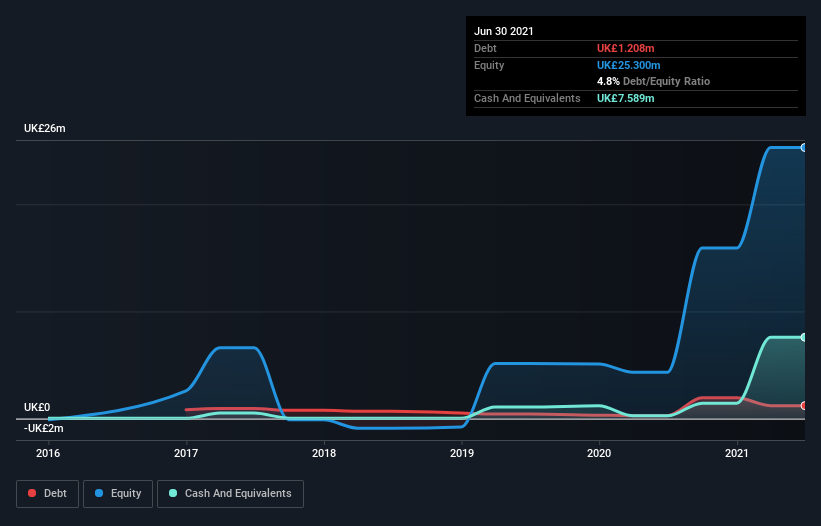Is DeepVerge (LON:DVRG) Using Too Much Debt?
Some say volatility, rather than debt, is the best way to think about risk as an investor, but Warren Buffett famously said that 'Volatility is far from synonymous with risk.' When we think about how risky a company is, we always like to look at its use of debt, since debt overload can lead to ruin. As with many other companies DeepVerge plc (LON:DVRG) makes use of debt. But should shareholders be worried about its use of debt?
What Risk Does Debt Bring?
Debt is a tool to help businesses grow, but if a business is incapable of paying off its lenders, then it exists at their mercy. Ultimately, if the company can't fulfill its legal obligations to repay debt, shareholders could walk away with nothing. However, a more usual (but still expensive) situation is where a company must dilute shareholders at a cheap share price simply to get debt under control. Of course, the upside of debt is that it often represents cheap capital, especially when it replaces dilution in a company with the ability to reinvest at high rates of return. When we examine debt levels, we first consider both cash and debt levels, together.
View our latest analysis for DeepVerge
How Much Debt Does DeepVerge Carry?
The image below, which you can click on for greater detail, shows that at June 2021 DeepVerge had debt of UK£1.21m, up from UK£275.0k in one year. However, it does have UK£7.59m in cash offsetting this, leading to net cash of UK£6.38m.
How Healthy Is DeepVerge's Balance Sheet?
We can see from the most recent balance sheet that DeepVerge had liabilities of UK£4.16m falling due within a year, and liabilities of UK£4.31m due beyond that. Offsetting this, it had UK£7.59m in cash and UK£2.22m in receivables that were due within 12 months. So it actually has UK£1.34m more liquid assets than total liabilities.
This surplus suggests that DeepVerge has a conservative balance sheet, and could probably eliminate its debt without much difficulty. Simply put, the fact that DeepVerge has more cash than debt is arguably a good indication that it can manage its debt safely. The balance sheet is clearly the area to focus on when you are analysing debt. But it is DeepVerge's earnings that will influence how the balance sheet holds up in the future. So if you're keen to discover more about its earnings, it might be worth checking out this graph of its long term earnings trend.
In the last year DeepVerge wasn't profitable at an EBIT level, but managed to grow its revenue by 359%, to UK£6.8m. When it comes to revenue growth, that's like nailing the game winning 3-pointer!
So How Risky Is DeepVerge?
By their very nature companies that are losing money are more risky than those with a long history of profitability. And the fact is that over the last twelve months DeepVerge lost money at the earnings before interest and tax (EBIT) line. And over the same period it saw negative free cash outflow of UK£6.0m and booked a UK£4.2m accounting loss. With only UK£6.38m on the balance sheet, it would appear that its going to need to raise capital again soon. Importantly, DeepVerge's revenue growth is hot to trot. High growth pre-profit companies may well be risky, but they can also offer great rewards. When analysing debt levels, the balance sheet is the obvious place to start. However, not all investment risk resides within the balance sheet - far from it. Case in point: We've spotted 5 warning signs for DeepVerge you should be aware of, and 3 of them can't be ignored.
At the end of the day, it's often better to focus on companies that are free from net debt. You can access our special list of such companies (all with a track record of profit growth). It's free.
This article by Simply Wall St is general in nature. We provide commentary based on historical data and analyst forecasts only using an unbiased methodology and our articles are not intended to be financial advice. It does not constitute a recommendation to buy or sell any stock, and does not take account of your objectives, or your financial situation. We aim to bring you long-term focused analysis driven by fundamental data. Note that our analysis may not factor in the latest price-sensitive company announcements or qualitative material. Simply Wall St has no position in any stocks mentioned.
Have feedback on this article? Concerned about the content? Get in touch with us directly. Alternatively, email editorial-team (at) simplywallst.com.

 Yahoo Finance
Yahoo Finance 
